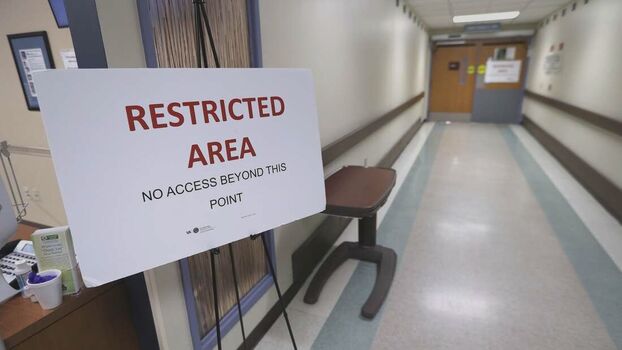|
In May 1983 my mother was diagnosed with a malignant tumor on her pancreas. After her surgery, when we talked on the phone, she was so vitriolic I refused to visit her. Three of her sisters, as well as my sister, kept calling, telling me, as usual, my mother didn’t mean what she said. Finally, tired of trying to explain why I didn’t want to visit, I gave up and took the train from Delaware to New York, wondering how my mother would treat me. On the way to the hospital, I stopped at a bookstore and bought a beautiful collection of folk tales. If we had trouble talking, I thought it would be nice to read a couple of stories, or so I hoped. When I arrived, there was a sign on the door: only two visitors allowed. My mother immediately began yelling at me. “Why didn’t you come sooner? I’m a sick woman...” When a male nurse came to clean her up, she sent him away. “No man is going to wipe my bottom. You’re my daughter, you do it.” Not the most pleasant way to begin a hospital visit.
She was not interested in listening to folk tales. Her relentless barrage of criticism—I was a terrible, selfish, self-centered daughter—only stopped when a friend of hers arrived. Then another friend. And another. Soon there were five of us in the room. I reminded her friends that only two people were allowed at one time and began suggesting that I and two others leave when my mother interrupted. “They’re my visitors. They stay.” I repeated that the sign on the door stated: only two visitors allowed at one time. Furious, my mother snarled, “It’s my room. I decide” As I prepared to leave, a nurse entered the room, looked around, and shook her head. “Mrs. Rubin is a sick woman. Only two visitors are allowed. Three of you have to leave. Now!” My mother didn’t miss a beat. In a voice dripping with feigned helplessness she said, “I told my daughter there were too many people in the room but she wouldn’t listen to me. She never does.” I gasped. None of her friends said a word. I left. Soon, two others came out of her room, passing me in the hallway. One woman, who wouldn’t look at me, said, “Your mother’s a sick woman; she doesn’t know what she’s saying,” as she rushed down the hallway giving me no chance to respond. I popped my head in the door, told my mother I was glad she had company, then left. I walked to the elevator feeling weighed down with resentment and anger, wishing I hadn’t allowed myself to give in to family urgings to visit her. Wondering why so many people protected her by saying she didn’t mean what she said when she clearly did. Then a strange thing happened. As I pushed the down button on the elevator door, I felt something shift inside me. I thought: I’m 46. I’m tired of her treating me badly. Tired of her lies. Tired of her never taking responsibility for anything she says or does. I reminded myself. I hadn’t done anything wrong. I came to visit with good intentions. In the elevator, as I looked at the number 9, it felt as if I were carrying nine pounds of emotion. Somehow, as the numbers lowered, I found the wherewithal to consciously let go of feelings that had seemed overwhelming. By the time I got to the ground floor I felt lighter, freer of resentment and anger and frustration. My mother was who she was. Her behavior didn’t have to determine who I was or how I felt. How do you let go of the emotional weight of being unfairly accused and treated badly?
1 Comment
Marlene Simon
2/3/2022 04:40:24 pm
How to answer this question? I guess everyone has their path. For me, as a highly sensitive person, it is challenging. I tend to personalize criticism and have had some very unhealthy relationships. I don't think we can change people and as adults, if we find ourselves in cruel and punishing relationships, I think the only thing to do is to get out of them. It's obviously incredibly more challenging when it is a family member, especially a parent. In that situation, the only sane thing to do is to extricate oneself from a toxic relationship and set clear boundaries. I think you were very strong to keep trying to be there for someone who was quite ill. I'm sure you've chalked up many brownie points with this relationship. And you have given hope to others by sharing your challenges and letting us see how resilient one can be. Perhaps forming relationships with giving and loving people is the antidote to toxic people. But trying to reform them is a losing battle. Unless someone is willing to meet you half way, it is futile and can be self-destructive to continue making the effort. But then again, this is just my point of view.
Reply
Leave a Reply. |
Monthly StoriesStories inspired by world tales to challenge and comfort. Archives
July 2024
Categories |
Copyright © Nancy King 2020 | Site Design by Angulo Marketing & Design
|
|
Nancy King is a widely published author and a professor emerita at the University of Delaware, where she has taught theater, drama, playwriting, creative writing, and multidisciplinary studies with an emphasis on world literature. She has published seven previous works of nonfiction and five novels. Her new memoir, Breaking the Silence, explores the power of stories in healing from trauma and abuse. Her career has emphasized the use of her own experience in being silenced to encourage students to find their voices and to express their thoughts, feelings, and experiences with authenticity, as a way to add meaning to their lives.
|


 RSS Feed
RSS Feed